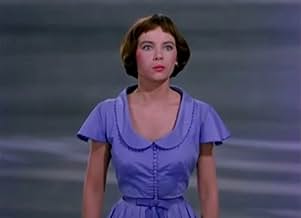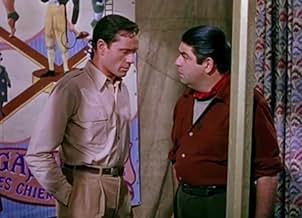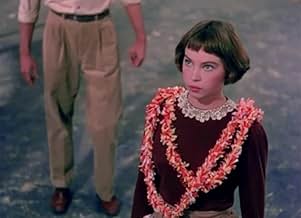Lili
- 1953
- Tous publics
- 1h 21m
IMDb RATING
7.2/10
4.2K
YOUR RATING
An orphaned young woman becomes part of a puppet act and forms a relationship with the anti-social puppeteer.An orphaned young woman becomes part of a puppet act and forms a relationship with the anti-social puppeteer.An orphaned young woman becomes part of a puppet act and forms a relationship with the anti-social puppeteer.
- Director
- Writers
- Stars
- Won 1 Oscar
- 7 wins & 9 nominations total
Jean-Pierre Aumont
- Marc
- (as Jean Pierre Aumont)
Jane Adrian
- Nautch Dancer
- (uncredited)
Nick Borgani
- Carnival Patron
- (uncredited)
Gene Conklin
- Whistler in Ballet Sequence
- (uncredited)
Paul Cristo
- Carnival Patron
- (uncredited)
George Davis
- Workman
- (uncredited)
Jeannine Ducasse
- French Girl
- (uncredited)
Bess Flowers
- Carnival Patron
- (uncredited)
Richard Grayson
- Flirting Vendor
- (uncredited)
- Director
- Writers
- All cast & crew
- Production, box office & more at IMDbPro
Featured reviews
All too rarely has a film about lost innocence and earnest love been so sensitively brought to the screen. Respected screenwriter Helen Deutsch (The Seventh Cross '44) adapted Paul Gallico's (The Snow Goose) darkly observant novella "The Seven Souls of Clement O'Reilly" into an inspiring story of a naive young orphaned girl coming of age. Deutsch also maintains the opportunistic exploitation of the vulnerable girl without sensationalizing this angle.
The Academy award-winning score by brilliant composer Bronislau Kaper is nothing short of unforgettable. This beautifully produced MGM film cannot be called a musical as there's only one song but what a song! It's been universally popular for over 60years, and screenplay writer Helen Deutsch also wrote the world-renowned lyrics.
The haunting dream-ballet sequence that closes this unique movie brings both tears of joy and wonder at its stirring and visually fascinating realisation. Apart from a couple of clunky trick edits, direction, cinematography (Robert Plank - 'Strange Cargo '40) and performances - combine to create movie making at its most magical - and should be seen by all lovers of classic film art. While it might not be to everyone's taste (what ever is?) in 2004 the New York Times added Lilli to their listing of the best 1,000 movies ever made.
The WB Archive DVD delivers an excellent visual and sound transfer.
The Academy award-winning score by brilliant composer Bronislau Kaper is nothing short of unforgettable. This beautifully produced MGM film cannot be called a musical as there's only one song but what a song! It's been universally popular for over 60years, and screenplay writer Helen Deutsch also wrote the world-renowned lyrics.
The haunting dream-ballet sequence that closes this unique movie brings both tears of joy and wonder at its stirring and visually fascinating realisation. Apart from a couple of clunky trick edits, direction, cinematography (Robert Plank - 'Strange Cargo '40) and performances - combine to create movie making at its most magical - and should be seen by all lovers of classic film art. While it might not be to everyone's taste (what ever is?) in 2004 the New York Times added Lilli to their listing of the best 1,000 movies ever made.
The WB Archive DVD delivers an excellent visual and sound transfer.
10WWalrus
"Lili", based on Paul Gallico's "Love For Seven Dolls", is one of the most delightful films ever. Leslie Caron deserved her Academy Award nomination as "Lili". The ballet sequence at the end of the film in which each puppet turn into Paul, the puppeteer, making Lili realize she loves him is magical. "Lili" was the basis for a big, lavish Broadway musical "Carnival" that lost the basic beautiful simplicity of the original. This film is a classic and deserves to be. The puppets are magnificent.
this is quite an old movie, as you know. my mother wasn't even born when it came out. yet i enjoy it greatly. it is a true love story, and unlike movies of today's age, it depicts that love with elegance and style. it is not only about love, but about the "blossoming" of Lili, of how she grows into womanhood and learns the ways of the world, as well as her own world. personally, i find it all to be quite symbolic, with Lili as the symbol of good and innocence. it also has some interesting humor in it (the puppets are well characterized and amazingly personalized). i think you will fall in love with the well-rounded main characters just as i did. i hope people will not be turned off by the age of the movie (it is over 50 years old now) because i find newer love stories to be far too sexual that leaves nothing to the imagination. this movie is VERY imaginative and beautiful in its storytelling. of course, kids could watch it and enjoy it to some extent, but the language is slightly elevated and the meaning is quite deep. watching this movie as an older person truly made the difference. i hope you enjoy it.
LILI, the 1953 film starring Leslie Caron in the title role, is one of the first examples of a screenplay being turned into a stage musical (CARNIVAL). Though it is common these days for Broadway to find inspiration in film sources, it was highly unusual at the time. It began life as a short story, with inspiration from the KOOKLA, FRAN AND OLLIE television program. Later made into a dark and unusual novella of sexual awakening, the tale was then adapted for the screen as LILI, a film which became the sleeper hit of 1953, eventually running in the same New York City theatre for almost 2 years. It's one, beautifully utilized song, "Hi Lili, Hi Lo" was an enormous hit and contributed to LILI's popularity.
The story, concerning the sexual and emotional coming of age of a young French girl, is unusual for its Freudian overtones and stark emotional mood. When young Lili (Leslie Caron in a gorgeously crafted and heartbreaking performance) comes to a small French village, looking for a family friend, she is devastated to learn that he has died. Without friends or family, she begs a job from a local merchant who sees her desperation as a sexual opportunity. When the merchant tries to rape Lili, she is saved by Marc, the handsome magician of a traveling carnival (Jean-Pierre Aumont). On Marc she foists all of her adult and childhood needs, her bursting sexuality along with her need to be cared for and loved. Eventually she begins working with the carnival but proves a terrible disappointment as a waitress in the carnival cafe. Lonely and desperate, she attempts to kill herself but is saved once again; this time by Paul the carnival puppeteer (a dashing Mel Ferrer in a fine performance) who speaks to her through his puppets, kindly Carrot Top, vain Marguerite, wily Reynaldo the Fox and innocent Horrible Henry the Giant. Paul, a former dancer, crippled years earlier in an accident, is full of anger and resentment but takes pity on Lili, who is so charmed by the puppets that, like a child, she forgets his presence.
The film explores their turbulent relationship as Lili becomes the star of the Carnival, charming patrons with an uncanny ability to speak to the puppets as if they are real. Complications arise as Paul begins to realize his own affection for Lili, while Lili continues to be infatuated with the magician, who's assistant (Zsa Zsa Gabor) is his wife.
With fine performances all around and an unusual atmosphere, the film has something of a cult following and is highly regarded for its frank and emotional nature. With its full-color cinematography, adorable puppets and carnival setting, this film might be mistaken for a children's story but deals, rather, with powerful adult themes. LILI may seem tame by today's standards, but given the conservativism of the 1950's as well as the strict production code in force at the time, LILI is rather shocking.
There is a very unusual dream sequence late in the movie which attempts to explore certain aspects of Lili's psyche through dance. This sequence is not entirely successful, but manages to get its point across and leads directly to the film's moving final moment. It's subtle treatment of a difficult subject is inspiring. The loss of innocence, the retreat from childhood and the desperate need for someone to love prove compelling subjects in a film that is, though imperfect, haunting.
The story, concerning the sexual and emotional coming of age of a young French girl, is unusual for its Freudian overtones and stark emotional mood. When young Lili (Leslie Caron in a gorgeously crafted and heartbreaking performance) comes to a small French village, looking for a family friend, she is devastated to learn that he has died. Without friends or family, she begs a job from a local merchant who sees her desperation as a sexual opportunity. When the merchant tries to rape Lili, she is saved by Marc, the handsome magician of a traveling carnival (Jean-Pierre Aumont). On Marc she foists all of her adult and childhood needs, her bursting sexuality along with her need to be cared for and loved. Eventually she begins working with the carnival but proves a terrible disappointment as a waitress in the carnival cafe. Lonely and desperate, she attempts to kill herself but is saved once again; this time by Paul the carnival puppeteer (a dashing Mel Ferrer in a fine performance) who speaks to her through his puppets, kindly Carrot Top, vain Marguerite, wily Reynaldo the Fox and innocent Horrible Henry the Giant. Paul, a former dancer, crippled years earlier in an accident, is full of anger and resentment but takes pity on Lili, who is so charmed by the puppets that, like a child, she forgets his presence.
The film explores their turbulent relationship as Lili becomes the star of the Carnival, charming patrons with an uncanny ability to speak to the puppets as if they are real. Complications arise as Paul begins to realize his own affection for Lili, while Lili continues to be infatuated with the magician, who's assistant (Zsa Zsa Gabor) is his wife.
With fine performances all around and an unusual atmosphere, the film has something of a cult following and is highly regarded for its frank and emotional nature. With its full-color cinematography, adorable puppets and carnival setting, this film might be mistaken for a children's story but deals, rather, with powerful adult themes. LILI may seem tame by today's standards, but given the conservativism of the 1950's as well as the strict production code in force at the time, LILI is rather shocking.
There is a very unusual dream sequence late in the movie which attempts to explore certain aspects of Lili's psyche through dance. This sequence is not entirely successful, but manages to get its point across and leads directly to the film's moving final moment. It's subtle treatment of a difficult subject is inspiring. The loss of innocence, the retreat from childhood and the desperate need for someone to love prove compelling subjects in a film that is, though imperfect, haunting.
"Lili" is one of the sweetest, most enchanting musicals Hollywood has ever produced. Not that most of the Hollywood musicals are ever realistic, but this particular story is more of a fable than an imitation of life. The character of Mel Ferrer is reminiscent of the Beast in "the Beauty and the Beast", a tortured soul aching for love, and as any girl worth her salt would know, tortured souls make the best kind of heroes!
The two dance/fantasy sequences are charming, especially the latter one, where Lili grows from an awkward, love-sick child into a woman of character and determination, all in a few steps of waltz. Oh, and the puppets are totally adorable!!
The two dance/fantasy sequences are charming, especially the latter one, where Lili grows from an awkward, love-sick child into a woman of character and determination, all in a few steps of waltz. Oh, and the puppets are totally adorable!!
Did you know
- TriviaThis film was based on The Saturday Evening Post's Paul Gallico's short story "The Man Who Hated People", published in the 28 October 1950 edition, which was inspired by the children's puppet show Kukla, Fran and Ollie (1947). Due to the success of the film, Gallico expanded the story into a novella.
- GoofsWhen Marc plays a magic trick with his cigarette at the notions store, he actually burns Lili's hand, right before playing the trick. Lili jerks her hand apart, but she keeps on watching Marc as if nothing has happened.
- Quotes
Lili Daurier: We don't learn. We just get older, and we know.
- ConnectionsEdited into Off to See the Wizard: Lili: Part 1 (1967)
- SoundtracksHi-Lili, Hi-Lo
Music by Bronislau Kaper
Lyrics by Helen Deutsch
Performed by Leslie Caron and Mel Ferrer
- How long is Lili?Powered by Alexa
Details
Box office
- Budget
- $1,353,000 (estimated)
- Runtime1 hour 21 minutes
- Color
- Aspect ratio
- 1.37 : 1
Contribute to this page
Suggest an edit or add missing content



































